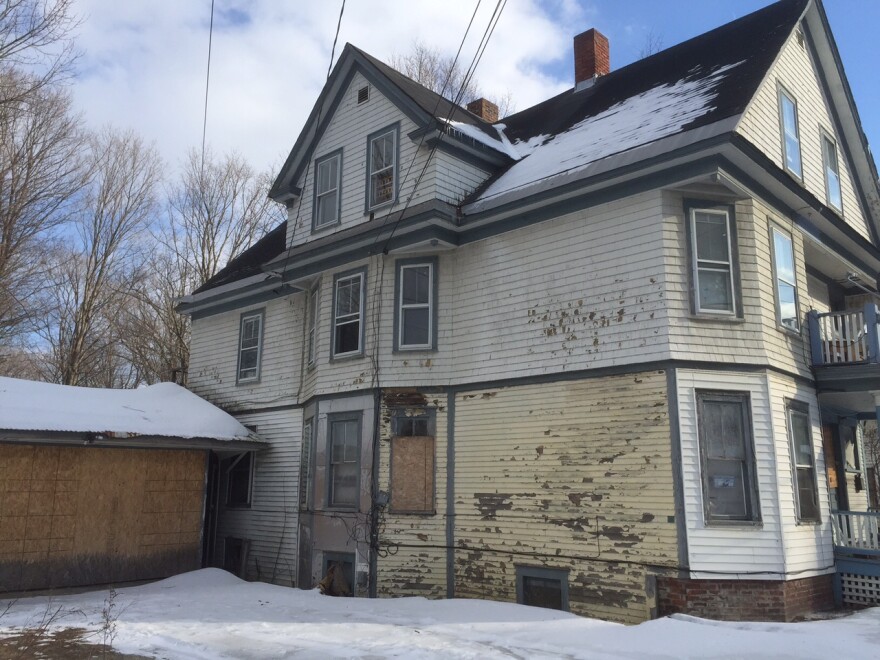There are vacant factories and run down houses all over Springfield, and the selectboard has been trying to work with landlords who own the most derelict properties.
Now the town wants to ramp up its response to clean up the dilapidated buildings.
The skeletons of Springfield's industrial past lurch over the downtown and sulk along the side streets. Boarded-up houses litter Springfield's neighborhoods, inviting drug use and other crime.
But according to Dick Andrews, it hasn't always been this way.
"In 1953 when I moved here Springfield was the most affluent town in the state," Andrews says. "That's hard to believe now when you look at Burlington and Springfield and compare them."
Andrews is a member of the Park/Union Neighborhood Association, a community beautification group.
He remembers when Springfield's factories churned out high-tech machine parts and the families of well-paid engineers and technicians called Springfield home. Then the jobs moved overseas, the machine shops closed and the town was left with polluted factories and vacant houses.
Andrews says if Springfield wants to move forward, it needs to clean up the remnants of its past.

"I think it's essential overall for economic development and for improvement of the tax base," Andrews says. "What I think people want is a level of appearance which indicates that people care about their surroundings, their neighbors, their town."
The selectboard has been trying to get landowners to fix up the most rundown buildings in town, but at a recent meeting board member Walter Martone said the board needs wider powers.
"Any comprehensive plan has to include both the carrot and the stick," Martone says. "We're not in the business of trying to kick people out of their homes or anything like that. But we have a lot of absentee owners and things that we have no way of dealing with it."
"What I think people want is a level of appearance which indicates that people care; about their surroundings, their neighbors, their town." - Dick Andrews, Springfield resident
At Town Meeting this year, Springfield voters will be asked to approve an urban blight article that could be the first step toward giving the board the power of eminent domain as well as opening the door for federal and state grants.
Martone says the town meeting vote will not commit the town to any further actions, but it does allow the board to continue pursuing new strategies for addressing the urban blight.

"We are trying to throw everything we possibly can at this problem," he says. "Some things may work and some things may not, but at least we're not losing any time. We're pulling out everything. All the stops."
Last year Town Meeting Day voters approved a $100,000 fund to aid in the cleanup efforts, and for the past few years the selectboard has been moving through a list of the 10 worst properties to gain traction.
But many of those efforts end up in court fights with the landlords, and incremental change takes much longer than it should.
Selectboard member George McNaughton says the town is working on an ordinance that would set up stricter property standards around schools, and a comprehensive economic development plan is also underway to move Springfield forward.
"We're not in the business of trying to kick people out of their homes ... But we have a lot of absentee owners and things that we have no way of dealing with it." - Walter Martone, Springfield selectboard member
"We're taking the first steps, and we're taking a lot of steps," McNaughton says. "But I think we're making progress. And we've got some things going for us. It's not all doom and gloom."
One thing Springfield has going for it is an affordable real estate market. That's catching the attention of developer Fred Martin.
"I truly think you take some of those old brick, industrial buildings down there, I think they can be gorgeous," says Martin. "And you're just getting in for hardly anything."

Martin owns Village Builders in Wolcott and he's purchased a derelict property on Valley Street in Springfield. He's going to tear down the building and construct a seven-unit condominium.
He says he got the property for almost nothing, and is lining up partners to make an investment in Springfield's future.
"If I'm wrong, then I'm going to fall flat on my face," he says. "But if I'm right, in 10 years people are going to say, 'That guy is brilliant.' I'm not brilliant at all, it's just, I see an opportunity there. When other people, especially people who live there, see nothing but a decayed neighborhood, all I see is just what it can be."
The thousands of high-paying jobs that fueled growth in Springfield through the first half of the 20th century are never coming back.
Some of the Selectboard members say it was hard at first to look at the town meeting article and admit Springfield has slums and urban blight.
But any vision toward a stronger community starts with safe, clean neighborhoods and industrial space that is ready for development.
Town officials say they have a plan and that they're going to start tackling the wide spread blight one building at a time.





